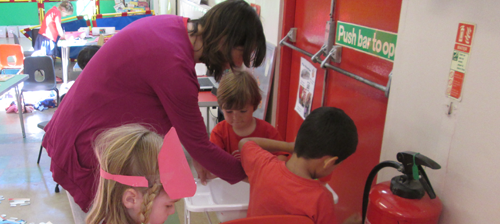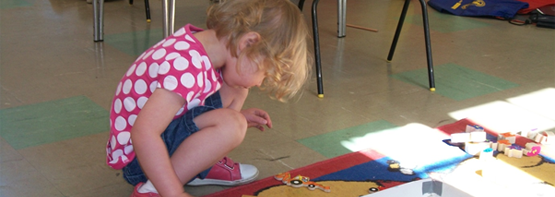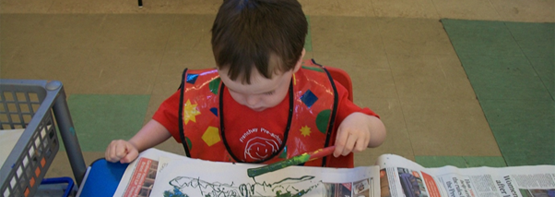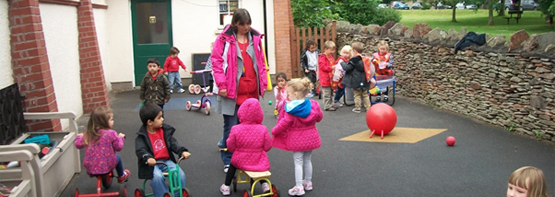Play and Curriculum
We follow the EYFS (Early Years Foundation Stage) and the following explains how learning through play works alongside the different areas of learning.

The children are learning without even realising it, by being involved with adults and children they have fun and take information onboard quickly through their play. We do not have tick lists that children must fulfil whilst with us – we treat each child as an individual. They all learn at a different rate and are interested in different things, so we plan for each child as an individual. We document all our observations of the children in their Learning Journey which is given to each child when they leave us to go to Reception Class.
Prime Area: Personal, social and emotional development
| Dressing up and role play involves: acting out roles – free or theme led; exploring feelings; learning to dress and undress independently |
Making music gives children the experience of expressing feelings together |
Playdough and construction toys give the opportunity to select and share materials and resources both independently and in a cooperative way |
| Books, jigsaws, pictures and stories give children the opportunity to increase concentration and develop resources for their cultural beliefs and those of others |
Drinking and eating together provide the opportunity for sharing, turn taking and managing personal hygiene |
Sand and water play enable children to progress from solitary observing to joining in with others |
| During Physical play and games children learn to take turns and work as part of a team in a competitive manner |
Outings provide a pleasurable experience with peers and adults whilst learning the appropriate behaviour for such occasions |
Creative activities enable children to try new ideas and motivate them to learn. |
Prime Area: Communication and Language
| Music, stories, rhyme and poems encourage children to discriminate sounds, to listen and to concentrate |
Computers enable children to explore and experiment with sounds, word and text |
| Imaginative play small scale, e.g. doll’s house, castle, develops the fine motor skills necessary for writing |
Sand, water and interest tables extend vocabulary by discussing objects and shared experiences with adults |
|
Circle and news time give children the opportunity to develop confidence in speaking, enabling them to comment, ask questions and explore
|
Prime area: Physical development
| Music and movement encourages children to use large muscles in a controlled fashion, whilst adding confidence, imagination and monitoring the changes that happen to our bodies |
Physical skills and hand-eye coordination can be developed and exercised with the use of balls, bean bags, hoops and skittles |
| Musical instruments and woodwork teaches children to handle tools in an appropriate way |
Steering wheeled toys mean learning to judge speed and direction |
| The climbing frame and clay each in their different ways tax and exercise large muscles |
Opportunities in snack, meal and circle time are used to recognise the importance of keeping healthy |
|
Construction with large materials, e.g. cardboard boxes helps children to develop a sense of balance and spatial awareness
|
Specific Area: Expressive Arts and Design
| Children are learning to express individual feelings, explore senses and responses when enjoying paints, woodwork, music, dance, role play and storytelling |
Collage and junk activities involve bringing together unfamiliar and familiar materials in 2 and 3 dimensions |
| Music sessions incorporating instruments, singing and dance give children the opportunity to explore sound patterns and movement |
Domestic play allows children to draw on all available resources, including their own experiences, to create a new situation or game |
|
Using lateral thinking in an open-ended play situation, children can draw on the available materials for their own purposes, e.g. using stickle bricks as food
|
Specific Area: Understanding of the World
| A variety of books can show children different cultures, abilities, festivals and interests |
Living and growing things helps children learn about the conditions needed for maintaining life |
Computers and programmable toys develop skills in communication and information technology |
| Cooking gives children the opportunity to experience the different tastes and food from different countries, etc |
Interest tables can be used to exercise links between home, playgroup and the environment and extend the children’s thoughts and interests beyond the group |
Music helps children develop their senses and experiment with the way sounds are made by using a range of instruments |
| Using a microscope or magnifying glass, children are able to look closely at similarities, differences, patterns and change |
Sand and water using pumps and wheels, etc., introduce children to tools and techniques |
Woodwork and construction activities enable choice and decision making |
Specific Area: Mathematics
| Construction activities involve children in estimating size and units of measurement |
Cooking involves measuring weight and volume, checking ingredients against a recipe and organising activities in order |
| In domestic play, children recognise one to one correspondence as they match clothes to dolls, etc |
Wheeled toys – beginning to judge relative speed and distance involves understanding about space and sequence |
| Puzzles and games establish the ideas of size and sequence, comparing and ordering |
Adventure play develops spatial awareness by moving along, beside, around and through things |
| Pegboards, beads and mosaics give practice in copying sequence and making patterns |
While painting, gluing and mixing dough, children are estimating quantities |
| Compare bears and sets give the opportunity to count up to 10 and use language, e.g. smaller and bigger |
Using sand and water develops the concepts of volume and conservation, offering a chance to use language, e.g. heavier, lighter, and draw comparisons |
| When handing out milk, children learn to add and subtract with real objects |
Specific Area: Literacy
| The use of labels help children to identify their own work, storage containers, craft materials and the group |
Role Play gives children the opportunity to use their imagination and engage in conversation and understand the uses of written language (shopping lists, calendars, etc) |
| Planned themes events, and activities give practice in using language to recall the past and envisage the future |
Puzzles and games assist the skills necessary to discriminate between similar looking shapes |
|
Recognise words using upper and lower case letters
|





